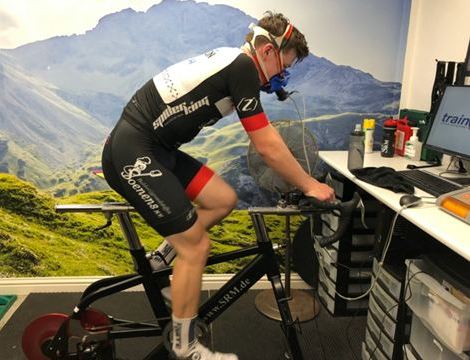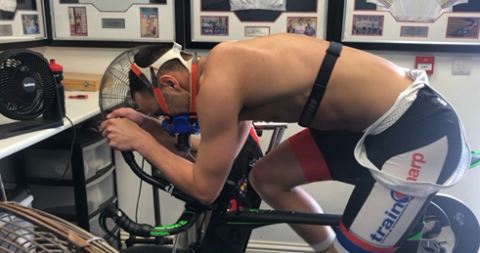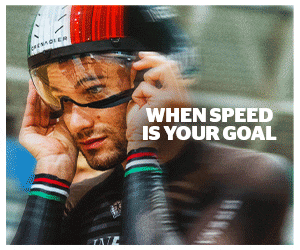With the cancellation of cycling events across the UK, competitive cyclists have a decision to make; to continue training and reap the rewards, or stop training all together due to lack of motivation. trainSharp’s Connor Murphy looks at detraining and how much fitness you will lose
 |
Detraining; how much fitness will I lose?
With the cancellation of cycling events across the UK, competitive cyclists have a decision to make; to continue training and reap the rewards, or stop training all together due to lack of motivation. But if you choose the latter, what will happen to those performance improvements and physiological adaptations that have been made through the winter?
This halt in training can be described as detraining, which can be defined as the partial or complete loss of training-induced anatomical, physiological and performance adaptations, as a consequence of training reduction or cessation. This falls under the principle of training reversibility whereby athletic performance is ultimately compromised by lack of or reduced training, past the point where performance is improved by a taper.
To really understand the characteristics of detraining, it must be recognised that the effects differ based on the type of athlete; highly trained or recently trained (but previously sedentary) and also whether we are discussing short term detraining (up to four weeks with no training) or long term detraining (more than 4 weeks with no training). It should also be noted that whilst there are numerous Cardiorespiratory, Metabolic, Muscular and Hormonal adaptations associated with detraining, the primary focus of this article will be surrounding the more notable performance associated effects, ones which we can measure in the trainSharp lab!
A typical load chart. Moving from left to right. A period of racing mid-season, fluctuations in training load due to races. Main season goal at the end of the season, again training load not increasing. A period of green in the middle, an end of season break/recovery from an operation. Then a period of structured winter training, training load is increasing gradually and performance is improving. Green represents a TSB of +10, blue between -10 &+10, red below -20. The height of the bar represents CTL.
… continued after advert
Maximal Oxygen Uptake
Maximal Oxygen Uptake or VO2max has been shown to decline with a short term reduction in training. Research shows that the higher the training status of an individual, the greater the losses in VO2max. Some studies showed that in highly trained individuals, VO2max can decline by 4-14% in the first few weeks, whereas in lesser trained individuals reductions are more like 3.5-5%.
Interestingly, some studies reported that VO2max was maintained over a period with no training; this was suggested to be due to the amount of activity completed during this period. As one may expect, the longer an athlete has a reduced training load, the more VO2max will decrease. It is likely that it will reduce by 6-20%, back to pre-trained values. Most research shows a progressive decline to pre-training values, however some research does suggest some retention.
Heart Rate
Heart rate (HR) is seen to increase at submaximal and maximal exercise intensities by around 5-10%. These changes in HR are largely driven by reductions in blood plasma volume; this also the driver behind a reduction in VO2max in the short term. After a lack of training for two weeks, maximal HR and resting HR are seen to stabilise.
Additionally, it is noted that stroke volume may decrease by 10-17%, which in turn leads to overall decreased cardiac output. If we turn our attention to long term detraining effects, we would also see that maximal HR will increase by around 5%. Additionally, recovery HR is also affected, increasing progressively with time of inactivity. Interestingly, the maximal HR of recently trained individuals is unlikely to be affected. These changes in HR are what we often see when we’re looking at our training data after a period off the bike – “My HR is 150, I’m only pushing 200 W” for example!
Endurance performance
The research on endurance performance is pretty clear, performance will decline rapidly after training load is reduced with regard to short term effects of detraining.
Various research articles have reported performance decrements from between 4 and 25% in time to exhaustion tests. Interestingly, in running, economy was not affected. When specifically discussing those who are recently trained (6-12 weeks of training), time to exhaustion was not affected with training cessation. There is not a vast amount of long term cycling detraining performance research available, after all, who would like to stop training completely for a long period of time. However, if we look specifically at football we can see that after a period of 5 weeks of inactivity, time to exhaustion was reduced by a massive 24%!
Blood lactate markers
At submaximal exercise intensities, blood lactate values are seen to increase after only a few days of training cessation. As lactate threshold is one of the key predictors of endurance performance, it goes without saying that it needs to be mentioned in this article! As both a short and long term effect, it can be seen that an athletes lactate threshold will occur at a much lower percentage of VO2max with higher blood lactate values at submaximal exercise intensities. Although lactate threshold occurs at a lower percentage of VO2max in a detrained state, it should be noted that these values were still higher than untrained individuals. In essence, this suggests that even after a prolonged period with no training, some physiological endurance adaptations are still maintained.
Retention of training induced adaptations
Whilst it may all seem like a vast amount fitness and performance will be lost when training is halted, this can be prevented to a degree. Lots of the research states that a reduced training load, in comparison to a complete cessation may become a valuable strategy in maintaining training adaptations. Although this is the case for moderately and recently trained individuals, this is not the case for highly trained athletes.
Even with reduced training strategies, performance makers are still likely to rapidly decline. At the current time and throughout this article, detraining has been discussed with reference to training cessation. Interestingly, it has been recognised in sports where there is a highly competitive season, detraining can still occur as there may not be enough training stimulus to retain training adaptations that were made in the winter. This leads me on to the conclusion of this article.
Summary
In summary, detraining due to training cessation in a period of uncertainty such as this one will have a large impact on your overall cycling performance, though it doesn’t have to be this way! We are now in a period of unprecedented times, this can be looked at as a positive or a negative. Yes there are no races, but this however means there is a significant period of time where training load can be increased, rather than maintained or decreased through the competitive season. Ultimately, If this is done correctly the latter part of the season (fingers crossed) could be your best ever!
If you are unsure about any aspect of your training then why not drop paul@trainsharp.co.uk an email. He can then put you in touch with one of their coaches.
Cycle Division’s Shop
Send your results as well as club, team & event news here
Other Results on VeloUK (including reports containing results)
- Features, Reports, Results
- QUIZ TIME! Dan Kemp (Prologue Junior Race Team)
- CX Result: Jersey Cyclocross League Jan 19
- CX Result: Army Cyclocross Champs 2025
- CX Result: Leicestershire Cyclocross League Rd 6
- CX Result: Western CX League Round 9
- CX Result: Tross Cross SQ R3 (Scotland)
- Track Result: 2025 Manchester Regional Track League (Jan 17)
- CX Result: Notts & Derby CX League 8
- FEATURE: Q&A with Carolyn Speirs
- Q&A with Sam Chaplin of Cycling Sheffield
- Quiz Time: James Hartley heading to France
- Rental getaway for cycling families — Casa Guadalest
- Track Result: Manchester Regional Track League (Jan 10)
- Crit Result: Full Gas Winter Circuit Series #10
- 2025 British CycloCross Championships Day 2
- 2025 British CycloCross Championships Day 1
- TEAM NEWS: RAPTOR FACTORY RACING
- STARTLIST: 2025 British Cyclocross Championships
- Q&A: Louis Herring (Prologue Junior Race Team)
- BRITISH CYCLOCROSS CHAMPIONSHIPS RIDER LIST
- Feature: Sophia Brooks (U16 road and track cyclist)
- CX Result: Wessex Cyclocross League Round 11
- CX Result: Lincolnshire Cyclo Cross Rd 11
- CX Result: Leicestershire CX League Rd 5
- NEXT WEEK: BRITISH CYCLOCROSS CHAMPIONSHIPS – CYCLOPARK
- National Trophy Round 5 – Day 1 (West Yorkshire)
- Q&A: UCI Race Winner in 2024 Josha Ludman
- FEATURE — Q&A WITH JAMES BEAGLEY (Prologue Junior Team)
- CX Result: Ripley Nova Cross 2025
- 2025 EVENTS: RTTC 10 mile TIME TRIAL CHAMPIONSHIP
- THIS WEEKEND: NATIONAL TROPHY SERIES 2024/25 ROUND 5
- CX Result: NWCCA CX League Round 10
- BMCR Newsletter January 2025
- CX Result: Yorkshire Cyclocross League rd 8
- CX Result: Jingle Cross (Jersey)
- CX Result: Notts & Derby CX League 7 (Darley Moor)
- TT Result: New Forest CC 10m TT
- CX Result: Coventry RC Boxing Day Cross
- TLI CYCLING RESULT: Round 6 of NECCL
- TLI Cycling Result: NE Cyclocross League Round 5
Other News on VeloUK
- 2025 British CycloCross Championships Day 2
- 2025 British CycloCross Championships Day 1
- TEAM NEWS: RAPTOR FACTORY RACING
- STARTLIST: 2025 British Cyclocross Championships
- Q&A: Louis Herring (Prologue Junior Race Team)
- BRITISH CYCLOCROSS CHAMPIONSHIPS RIDER LIST
- NEXT WEEK: BRITISH CYCLOCROSS CHAMPIONSHIPS – CYCLOPARK
- 2025 EVENTS: RTTC 10 mile TIME TRIAL CHAMPIONSHIP
- THIS WEEKEND: NATIONAL TROPHY SERIES 2024/25 ROUND 5
- BMCR Newsletter January 2025
- TEAM NEWS: BCC Race Team 2025 Squad Announcement
- TEAM NEWS: 2025 Handsling Alba Development Road Team
- Q&A with Paul Opie & Tom Mead
- Team News: New Junior team for West Lothian Clarion
- 2025 Events: Plymouth Corinthian
- News: Junior/Youth National Series 2025
- Startlist: Round 4 National Trophy Cyclocross (Dec 7/8)
- ELITE ROAD AND CIRCUIT RACES CALENDAR
- Sad News: No Saint Piran team for 2025
- News: The Pedal Club Lunch (November)
- Team Update: Brother UK / Onform 2025
- 2025 NATIONAL TRACK CALENDAR ANNOUNCED
- CHS CICLISMO – Complimentary daily massage and spa!
- Team News: Fensham Howes – MAS Design 2025
- National Trophy Cyclocross: Round 3 (Torbay)
- Tofauti Everyone Active announces new partners and new name for 2025
- Rider News: Matt Thompson signs for French Team BMC Bezier
- News: Youth Tour of Scotland 2025
- FEATURE: Billy Ladle’s Stellar Season Recognised at British Cycling Awards
- 2025 Prologue Junior Race Team
- STARTLIST: BUCS Hill Climb Championships
- News: West Midlands Road Race League Winner 2024
- Tofauti Everyone Active reveals its roster for 2025
- This weekend: National Trophy Cyclocross 2
- Team News: INEOS Announce Structure/Staff Changes
- STARTLIST: RTTC National Hill Climb Championships
- Feature: The Pedal Club Lunch (October)
- NEWS! Max Walker joins EF Education-EasyPost
- World Tour win for Ethan Vernon
- Louise Sutton signs for Euskaltel Euskadi Team


























